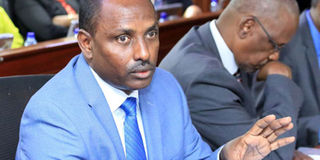Punish culprits of deceit at the Treasury and correct the books

Labour and Social Protection Cabinet Secretary Ukur Yattani when he appeared before a Senate committee on August 9, 2018. PHOTO | JEFF ANGOTE | NATION MEDIA GROUP
What you need to know:
- The Treasury has been forced by reality to look into the mirror and accept that things don’t look too rosy as far as government finances are concerned.
- Of late, KRA has been arresting traders and closing down businesses and raiding premises of companies with unprecedented ferocity
Last week’s utterances in the Senate by acting National Treasury Cabinet Secretary Ukur Yatani on the proposal to increase the ceiling on public debt to Sh9 trillion were, to say the very least, astonishingly jarring.
Mr Yatani was appearing before the Senate Committees on Delegated Legislation, Finance, and that of the Budget to make the case for a raising of the debt ceiling to bring government borrowing within thresholds stipulated in the Public Finance Management Act.
If you missed it, here are of the quotes from the minister’s pronouncement: “If we are not guaranteed this amendment, there will be a crisis in the country because we will not be able to implement this year’s budget.” “We will also be unable to do the debt restructuring we need to do so as to retire some of the old and expensive commercial loans that are chocking our economy.”
DEBT CEILING
Mr Yatani went on to tell senators that negotiations for budget support with various lenders had been concluded, but cannot be signed off with the current debt ceiling.
I think the pertinent question, which the senators should be asking Mr Yatani is: Have we borrowed outside the law, and who should be punished for this egregious breach to the law of the land?
To appreciate just how pertinent this question is, I invite you to the contents of a public statement that the Director of Public Prosecution put out on July 21 as he announced the arrests of former Treasury CS Henry Rotich and his PS, Dr Kamau Thugge, over the Kimwarer and Arror dams scandals.
Noordin Haji accused the two of having ignored a March 2017 internal Treasury report that cautioned against the signing of loan contracts for the two dam projects as the borrowing would push the government to debt levels beyond the ceiling.
The DPP said this important advice by a technical Treasury staffer was ignored.
BETRAYAL
“It is a high betrayal of public trust to disregard and breach debt regulations,” Mr Haji said. “This kind of crime and irresponsibility enslaves us with unnecessary debts and mortgages our future generations.”
I will stop there as I do not wish to cram my column with long direct quotes from statements made by others. However, the DPP’s statement revealed that the debt ceiling may have been exceeded as far back as March 2017, when Arror and Kimwarer loans were being contracted.
The Treasury has been forced by reality to look into the mirror and accept that things don’t look too rosy as far as government finances are concerned. The approvals of both the Senate and National Assembly are now needed to allow the government to comply with the law.
Mr Yatani spoke as he did because reality had dawned on him, forcing him to admit publicly that he does not believe in the fantasy world his predecessors at the Treasury had painted all along.
INTEGRITY ISSUES
Clearly, we have major integrity issues with the quality of statistics on government finances. What has been going on is but a blatant game of deception that starts with the Treasury giving us exaggerated GDP growth numbers, which lead them to produce exaggerated revenue targets, unsustainable budget deficits, and on to spending plans they are incapable of funding.
Indeed, the reason government books are forever saddled with huge pending bills is because our budgets are written on the basis of assumptions and projections of money that we don’t have.
Have you asked yourself why the Kenya Revenue Authority has not been meeting tax collection targets for more than 10 years? Remember that the administration of President Mwai Kibaki used to break every revenue target on sight.
Of late, KRA has been arresting traders and closing down businesses and raiding premises of companies with unprecedented ferocity, behaving as if the taxpaying public all turned into thieves and tax cheats after Mr Kibaki and former KRA Commissioner-General Michael Waweru left the scene.
The main reason KRA has been missing targets is sluggish conditions in the macroeconomy and over-optimistic assumptions used in compiling national accounts.
RESTORE CREDIBILITY
I’m not a big fan of the International Monetary Fund (IMF), but one option open right now to restore credibility and believability in government numbers is to quickly negotiate a programme with the IMF. I am not saying that we borrow money. Our accountability institutions, including Parliament have been asleep.
Lastly, I gather that the government has compiled a long list of parastatals, complete with the billions of shillings they are required to surrender to the Treasury. Where is growth going to come from when the shareholder is demanding money from cash flows?
Chopped logic.





